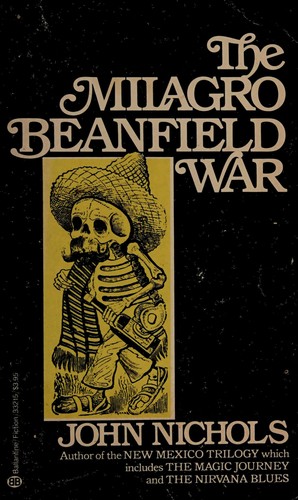A war of ideas, via beans
5 stars
A wildly entertaining and enthralling story of a small New Mexico town (Milagro) and the effects of money, power, history, and perception, on the lives of both its residents, both poor and wealthy. The author spares no paragraphs in telling the sometimes tragic, sometimes ridiculous, history of the towns residents, many of whose families date back to original Spanish settlers.
What I've really been left thinking about is the statement it makes about the outsized importance that the perception of power plays in determining the towns fate. While the richest person in town (referred to via nicknames and translation from Spanish as "Vulture" Devine ) has accumulated most of the land and power in town, seizing on the times of weakness of the poor, what doomed the residents, and their ancestors, to dispossession was their perception that they were powerless. The crux of the novel is about taking power, even …
A wildly entertaining and enthralling story of a small New Mexico town (Milagro) and the effects of money, power, history, and perception, on the lives of both its residents, both poor and wealthy. The author spares no paragraphs in telling the sometimes tragic, sometimes ridiculous, history of the towns residents, many of whose families date back to original Spanish settlers.
What I've really been left thinking about is the statement it makes about the outsized importance that the perception of power plays in determining the towns fate. While the richest person in town (referred to via nicknames and translation from Spanish as "Vulture" Devine ) has accumulated most of the land and power in town, seizing on the times of weakness of the poor, what doomed the residents, and their ancestors, to dispossession was their perception that they were powerless. The crux of the novel is about taking power, even in small, stupid, spiteful ways that aren't "political statements", but just individual's asserting their power to do something forbidden because it makes them feel less hopeless. Though some of the poorer residents try to transform the small act of refusal into a catalyst for collective progress, they struggle with their communities own divisions, personal histories, and fears. Nonetheless, the powerful residents start to believe the poor are organizing and dangerous, and that perception starts to tilt the balance of power.

